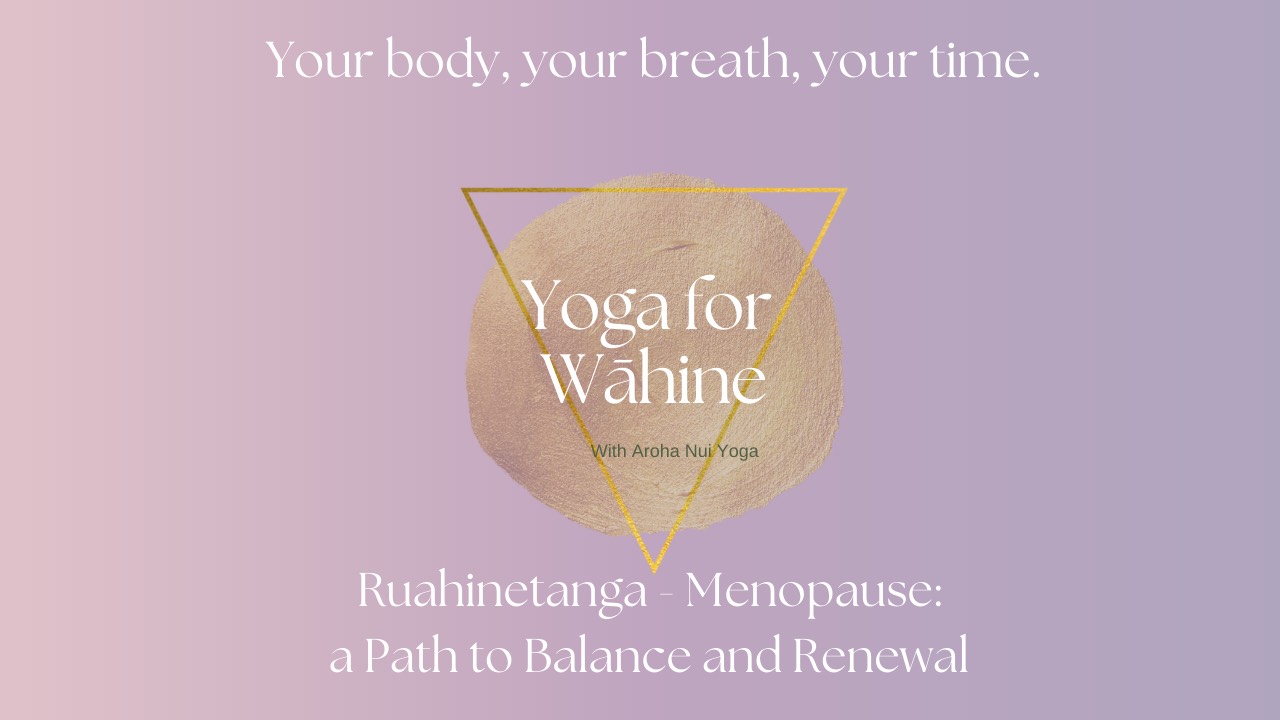Yoga for Wāhine during the Menopause Transition: A Path to Balance and Renewal

Yoga for Wāhine during the Menopause Transition: A Path to Balance and Renewal
Menopause - Ruahinetanga is not an ending, but a powerful transition — a time of deep wisdom, reflection, and renewal. For many women this season of life can bring both challenges and opportunities.
In Chinese medicine it is referred to as The Second Spring, not an ending but a new beginning.
Hot flushes, sleep disturbances, mood shifts, and changes in energy are common, but so too are insights, clarity, and the chance to reconnect with our bodies in a new and more compassionate way.
Yoga offers gentle yet profound support for wāhine in menopause. It’s more than stretching or exercise — it’s a wholistic practice that nurtures the nervous system, supports hormonal balance, and helps us meet this stage of life with grace.
🌿 Benefits of Yoga During Menopause
• Regulates the Nervous System -
Breath work and restorative poses activate the parasympathetic nervous system, easing anxiety, irritability, and sleep disturbances.
• Supports Hormonal Balance -
While yoga doesn’t directly replace hormones, practices that reduce stress can help regulate cortisol levels, which in turn may help to reduce hot flushes and night sweats.
• Strengthens Bones and Joints-
Weight-bearing poses (like standing postures) help maintain bone density, which is vital during and after menopause. Gentle mobility practices can ease stiffness and arthritis-like symptoms.
• Improves Sleep -
Relaxation practices and yoga nidra help calm a racing mind, encouraging deeper and more restful sleep.
• Enhances Mood & Emotional Wellbeing -
Through mindfulness and presence, yoga can ease mood swings, lift low energy, and foster a sense of inner steadiness.
• Reconnection to Wairua (Spirit) -
Menopause can be an awakening time. Yoga provides space for reflection, meditation, and connecting to the deeper self — embracing this transition as sacred rather than something to endure.
I believe that the Ruahine is a woman at the peak of her power and wisdom.
She contains the seed of the divine feminine, and has the collective wisdom of all the other stages of life as a wahine.
⚖️ Things to Be Aware Of
• Overheating
Hot flushes may worsen in heated or vigorous styles. You may like to slow down your practice. Choose slow mindful flows, and avoid pushing to exhaustion.
• Joint Sensitivity
Declining estrogen can affect connective tissues, so listen to your body and adapt poses with props or softer variations. Support your body. See props as allies.
• Bone Health
While weight-bearing is important, avoid sudden or jerky movements if you have osteoporosis or low bone density. Try steady strengthening, moving in a flowing way throughout your practice.
• Energy Fluctuations
Some days may call for restorative, nurturing practice. Other days you may crave movement. Honour what your body is asking for.
🌿 Best Yoga Practices for Menopause
• Prioritise Restorative Poses
Legs up the wall, supported child’s pose, and reclined butterfly with props - if appropriate for you - are soothing and cooling.
• Breathe Deeply and Slowly
Gentle pranayama (like alternate nostril breathing or simple diaphragmatic breathing) helps regulate the nervous system. If strong breathing practices are too heating for you these can be avoided. The Cooling Breath may work wonders for you!
• Build Strength Wisely
Include standing postures (warriors, chair, tree pose) for bone health and stability. Use props to support balance and alignment. Make any adaptions you need
• Practice Cooling Sequences
Forward folds, supported backbends, and side body stretches can feel refreshing and grounding.
However, everyone is different, so if you find balance with heating, dynamic practices then do incorporate them into your practice. Awareness is key. If it feels wrong stop.
Remember your practice can evolve over time to be sustainable.
You may even find it deepens with this new stage of life. Explore practices that challenge the idea that yoga is only a physical practice too.
• Stay Consistent but Gentle
A little practice every day can be very effective, rather than erratic long sessions. Even 10–15 minutes of mindful movement and breath or yoga nidra can make a difference, and can make the time you spend in class flow, and feel special too. A longer practice or class can be your time devoted just to you.
• Embrace Meditation and Mindfulness
Quiet practices calm the mind, deepen self-awareness, and help reframe the menopause transition as a powerful rite of passage.
🥝 Ngā hua - possible outcomes from practice
With regular practice, wāhine in ruahinetanga/ menopause may notice:
• Fewer or less intense hot flushes
• Improved sleep quality and reduced night waking
• Greater steadiness of mood and less anxiety
• Stronger bones and muscles
• More energy and vitality during the day
• A deeper sense of peace, presence, and acceptance of this life stage. Greater strength, affirmed identity, a deeper sense of who you are and clarity on life
🌺 Heoi ano , so ...
Menopause/ Ruahinetanga is a sacred turning point — a time to shift from giving endlessly outward, into making time to receive, listening to your body and soul, and replenishing.
Yoga offers a beautiful pathway for this, helping us step into the wisdom years with strength, softness, and aroha.
You don't have to give up your yoga practice at this time, rather embrace the gift of renewal by finding the practices that work for YOU.
Rediscover your WHY- your intention for your practice. This is time for Your Yoga, Your Way.
You do not need to do it perfectly. You only need to show up for yourself, as you are, breath by breath, pose by pose, day by day.
Ngā manaakitanga,
Linsey 🤍

